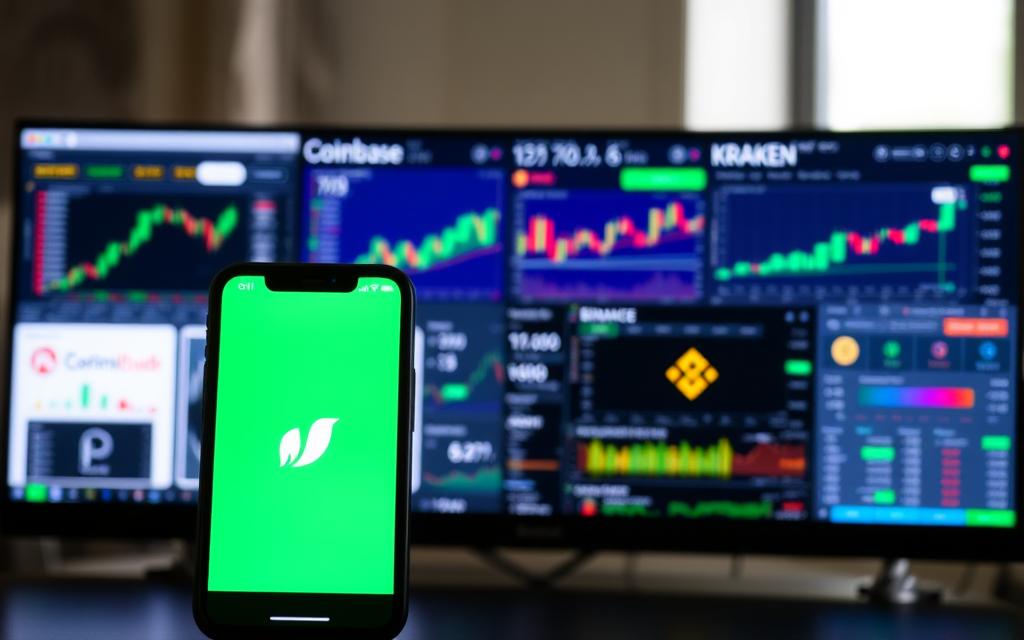Table of Contents
Many investors turn to Robinhood for its commission-free trading of stocks, ETFs, and digital assets. The platform stands out for its user-friendly app, making cryptocurrency accessible to beginners.
Security remains a top concern when handling digital assets. Robinhood maintains a clean record with no reported losses from cyberattacks. Traditional assets benefit from FDIC insurance ($250k) and SIPC protection ($500k).
The company goes further with cryptocurrency by securing specialized insurance through Lloyd’s syndicates. Cold storage and penetration testing add layers of protection for user funds.
While the platform complies with FINRA and FinCEN regulations, crypto trading carries inherent risks. Investors should understand these differences compared to traditional markets.
Introduction to Robinhood Crypto Trading
Since launching in 2013, Robinhood has expanded beyond stock trading to become a major player in digital assets. The platform now supports 26 cryptocurrencies, including Bitcoin, Ethereum, and Dogecoin, catering to both beginners and seasoned traders.
Robinhood’s mobile-first design simplifies the process for new investors. Fractional trading allows users to buy portions of high-value assets—though Dogecoin remains an exception. This feature lowers entry barriers in volatile markets.
Independent 2024 tests revealed a 4.62% pricing advantage over Coinbase, making Robinhood a cost-effective choice.
State-specific restrictions apply, such as USD Coin limitations in New York and Texas. Despite this, availability spans all 50 states, with cold storage securing most holdings.
The platform’s millennial appeal stems from its intuitive interface and integration with traditional portfolios. As a FINRA-compliant brokerage, Robinhood merges accessibility with regulatory compliance, setting a foundation for secure transactions.
Is Robinhood Safe for Crypto? Key Security Features
Digital asset protection remains a priority for platforms handling cryptocurrency transactions. Robinhood implements banking-grade safeguards, combining encryption, insurance, and proactive testing to shield user accounts.

Insurance Protections for Assets
Traditional investments enjoy FDIC and SIPC coverage, but cryptocurrency requires specialized policies. Robinhood partners with Lloyd’s of London to insure institutional holdings against theft or breaches. This crime insurance supplements cold storage for added peace of mind.
Penetration Testing and Whitehat Hacking
External experts simulate cyberattacks quarterly to identify vulnerabilities. The platform’s bug bounty program rewards researchers for reporting flaws, ensuring continuous improvement. Real-time monitoring detects unusual activity, locking down compromised accounts instantly.
Password Security and Encryption
BCrypt hashing and AES-256 encryption protect login credentials. TLS protocols secure data transfers, matching standards used by major banks. For deeper insights, review crypto security measures across top exchanges.
Two-Factor Authentication (2FA)
Users can enable 2FA via authenticator apps or SMS. Biometric logins (Face ID, fingerprint) add mobile-specific layers. Avoid SMS-based codes if possible—authenticator apps offer stronger resistance to SIM-swapping attacks.
Crypto Withdrawal Defaults
New accounts restrict withdrawals until identity verification completes. This default lockdown prevents unauthorized transfers, requiring manual activation for wallet access. Over 90% of assets stay offline in cold storage, minimizing hot wallet exposure.
Potential Risks of Using Robinhood for Crypto
No platform is completely risk-free, and Robinhood’s crypto services come with unique challenges. While its security measures are robust, investors should weigh these vulnerabilities against their trading needs.
Limitations of Insurance Coverage
Robinhood’s specialized insurance through Lloyd’s of London excludes losses from user negligence. For example, sharing login credentials voids protection. Only institutional holdings qualify—individual wallets lack direct coverage.
Vulnerabilities in 2FA
SMS-based authentication remains prone to SIM-swapping attacks. Hackers exploit carrier weaknesses to intercept codes. Authenticator apps like Google Authenticator offer stronger security but require manual setup.
Cracking of Password Hashes
Modern GPUs can crack weak passwords in hours. Robinhood uses BCrypt hashing, but reused credentials from other breaches pose risk. A 2023 study showed 60% of users repeat passwords across platforms.
Enabled Crypto Withdrawals and Wallet Risks
Withdrawals activate after identity checks, but 10% of funds stay in hot wallets for immediate access. This operational reserve could attract exploits, unlike cold-stored assets.
Data Breaches and Personal Information Exposure
In 2021, a breach exposed 5 million emails and 2 million names. While no funds were stolen, leaked information aids phishing. Third-party integrations (e.g., Plaid) may also expose banking data.
“Social engineering targets customer support—always verify requests through official channels.”
Tax documents and margin trading further complicate account safety. Regulatory shifts could also freeze asset access during investigations.
The 2021 Robinhood Hack: What Happened?
Cybercriminals targeted Robinhood through an unexpected attack vector last year. On November 3, 2021, hackers accessed customer support systems using stolen employee credentials. This social engineering attack compromised personal information for millions.

The breach exposed 5 million email addresses and 2 million full names. Approximately 310 phone numbers were also accessed. No financial data or cryptocurrency wallets were compromised during the incident.
Robinhood’s security team detected the intrusion within hours. They contained the breach by revoking the stolen credentials. The company then launched forensic investigations with third-party cybersecurity experts.
“We immediately locked down the affected systems and notified law enforcement,” stated Robinhood’s Chief Security Officer.
The hacking group demanded extortion payments after the breach. Robinhood refused to pay, instead focusing on security upgrades. This included enhanced employee training and stricter access controls for sensitive systems.
Compared to Coinbase’s 2021 incident affecting 6,000 users, Robinhood’s breach had wider reach but less financial risk. Both events highlighted how social engineering targets human weaknesses rather than technical flaws.
All affected users received notifications within one week. The company provided free credit monitoring and identity protection services. Regulatory filings later revealed a $30 million expense for breach-related costs.
Investor confidence dipped temporarily, with shares falling 3.2% post-disclosure. However, the platform regained trust by implementing biometric authentication mandates and advanced threat detection systems.
This incident teaches valuable lessons about personal information protection. Always enable multi-factor authentication and monitor account activity regularly. Financial investors should remain vigilant against phishing attempts.
How Robinhood Compares to Other Crypto Exchanges
Choosing the right platform for digital asset trading requires comparing key features across top crypto exchanges. Robinhood’s commission-free model competes with specialized platforms like Coinbase and Binance, each catering to different investor needs.

Robinhood vs. Coinbase
Independent 2024 tests revealed a 4.62% pricing advantage on Robinhood for a $500 trade. Coinbase charges a 0.46% taker fee, while Robinhood earns through payment for order flow.
Coinbase supports 250+ assets versus Robinhood’s 26. However, Robinhood’s interface excels for beginners with fractional trades and integrated stock portfolios.
Robinhood vs. Binance
Binance dominates with 350+ coins and advanced trading tools. Robinhood’s streamlined app lacks futures or margin options but offers FDIC-insured cash balances.
Withdrawals differ sharply: Binance allows instant transfers, while Robinhood requires manual activation after verification.
Robinhood vs. Kraken
Kraken’s 1.79% fee disadvantage contrasts with Robinhood’s zero-commission model. Professionals favor Kraken for charting tools, but Robinhood wins on mobile app ratings (4.7/5 vs. 3.8/5).
Insurance coverage varies—Kraken and Coinbase disclose fuller policies, while Robinhood relies on Lloyd’s for institutional holdings only.
“Robinhood’s strength lies in merging traditional investing with crypto accessibility, though advanced traders may find limits.”
KYC timelines average 24 hours across platforms, but Robinhood restricts NFT market access. Institutional features like OTC trading remain exclusive to Coinbase and Kraken.
Tips to Enhance Your Robinhood Crypto Security
Protecting digital assets demands proactive security habits beyond platform defaults. These measures reduce exposure to theft, phishing, and unauthorized access.

Using Strong, Unique Passwords
Weak credentials remain the top cause of compromised accounts. Follow these standards:
| Parameter | Minimum Requirement | Best Practice |
|---|---|---|
| Length | 12 characters | 16+ characters |
| Complexity | Upper/lowercase + numbers | Add symbols (e.g., @#%) |
| Uniqueness | No repeats across sites | Password manager generated |
Enable biometric logins where available. YubiKey hardware adds physical authentication layers.
Opting for Authenticator Apps Over SMS 2FA
Two-factor authentication via SMS risks SIM-swapping attacks. Google Authenticator or Authy generate time-based codes offline. Setup takes three steps:
- Scan QR code in account settings
- Store backup recovery keys offline
- Disable SMS fallback options
Monitoring Account Activity
Review login alerts and transaction histories weekly. Robinhood’s activity log shows:
- Device types and locations
- Failed login attempts
- Pending withdrawals
“Treat security logs like bank statements—regular checks prevent undetected breaches.”
Avoiding Phishing Scams
Fraudulent emails mimicking Robinhood often contain:
- Urgent action demands (e.g., “Verify your wallet now”)
- Mismatched sender addresses
- Shortened links hiding destinations
Bookmark the official site instead of clicking email links.
Managing Crypto Withdrawals Wisely
Limit hot wallet exposure with these protocols:
- Whitelist withdrawal addresses after verification
- Transfer 80% of holdings to cold storage
- Enable 24-hour delay for new recipient approvals
API keys should have read-only permissions unless actively trading.
Robinhood’s Regulatory Compliance and Legal Standing
Regulatory oversight shapes every aspect of Robinhood’s cryptocurrency operations. As a registered brokerage (FINRA #CRD 165998), the platform follows strict federal and state regulations. This framework ensures investors benefit from transparency and accountability.
The SEC’s 2020 $65 million settlement highlighted Robinhood’s commitment to resolving past disclosure lapses. Ongoing audits now enforce stricter reporting on payment for order flow practices.
“Robinhood’s corrective actions post-settlement set a benchmark for compliance in fintech,” noted a 2023 FINRA report.
State-level licensing includes New York’s rigorous BitLicense, granted after proving anti-fraud and capital reserve standards. The platform also holds money transmitter licenses in all 50 states, enabling seamless crypto transfers.
Anti-Money Laundering (AML) protocols require identity verification for all trades exceeding $3,000. Suspicious activity reports are filed with FinCEN, aligning with banking-sector practices.
Unlike unregulated exchanges, Robinhood participates in the Privacy Shield framework for transatlantic data protection. GDPR compliance includes right-to-erasure options for EU users—a contrast to FTX’s pre-collapse oversight gaps.
Disaster recovery tests simulate cyberattacks quarterly, exceeding FINRA’s annual mandate. Shareholders receive detailed disclosures on lobbying expenditures, including $1.2 million in 2023 for crypto policy advocacy.
Pros and Cons of Robinhood for Crypto Trading
Evaluating Robinhood’s cryptocurrency offerings requires balancing accessibility against advanced trading needs. The platform serves casual investors well but shows limitations for power users. This breakdown highlights where it excels and falls short in the competitive exchange landscape.
Advantages That Attract Traders
Robinhood’s zero-fees structure eliminates per-trade costs that erode profits on other platforms. A 2024 analysis showed 4.6% better pricing than Coinbase for typical trading volumes.
The mobile app delivers exceptional usability with three standout features:
- One-tap fractional purchases (except Dogecoin)
- Integrated stocks and crypto portfolio views
- Recurring investment automation
“Robinhood’s tax lot optimization tools help minimize capital gains—a rare feature among commission-free platforms.”
Limitations to Consider
Only 26 crypto assets are available, compared to 240+ on Coinbase. The restricted selection excludes many altcoins favored by active traders.
| Feature | Robinhood | Competitor Average |
|---|---|---|
| Supported Assets | 26 | 150+ |
| Native Wallet | No | Yes (85% of rivals) |
| Educational Resources | Basic | Advanced (e.g., Coinbase Learn) |
Without a dedicated wallet, users can’t participate in staking or NFT markets. Customer support response times average 72 hours—slower than specialized exchanges.
While 95% cold storage protects assets, the app lacks social trading features and interest-bearing accounts common elsewhere. Portfolio rebalancing requires manual adjustments.
Conclusion: Is Robinhood the Right Choice for Crypto Investors?
Deciding on a platform requires weighing security against convenience. Robinhood suits beginners with its intuitive app and fractional trading, but advanced investors may crave more assets or tools.
The cryptocurrency space evolves rapidly. Planned features like staking could bridge gaps with competitors. Until then, assess your priorities—cost efficiency versus diversity.
For optimal safety: enable 2FA, monitor activity logs, and diversify holdings across cold storage. Regulatory clarity will shape long-term viability as adoption grows.
Newcomers benefit most from Robinhood’s blend of stocks and digital assets. Others might explore Coinbase for altcoins or Kraken for advanced charts. Choose wisely.
FAQ
What security measures does Robinhood have for cryptocurrency trading?
The platform employs encryption, two-factor authentication, and insurance protections. Regular penetration testing helps identify vulnerabilities.
Can I withdraw my cryptocurrencies to an external wallet?
Yes, withdrawals are supported, but users must enable the feature in their account settings first.
How does Robinhood protect against data breaches?
Advanced encryption safeguards personal information, and whitehat hacking programs help uncover security flaws.
Are there risks associated with using Robinhood for crypto?
Potential risks include phishing scams, limited insurance coverage, and reliance on SMS-based two-factor authentication.
How does Robinhood compare to exchanges like Coinbase or Binance?
Unlike dedicated crypto exchanges, Robinhood offers commission-free trades but lacks native wallets and a broad asset selection.
What happened during the 2021 Robinhood security breach?
Hackers accessed personal data of millions, though funds remained secure due to segregated storage.
What steps can I take to improve security on my account?
Use authenticator apps for 2FA, create strong passwords, monitor transactions, and avoid suspicious links.
Does Robinhood comply with financial regulations?
The platform adheres to SEC and FINRA guidelines, providing transparency in its operations.
What are the main drawbacks of trading crypto on Robinhood?
Limited coin offerings and inability to transfer assets directly to private wallets may deter advanced traders.









